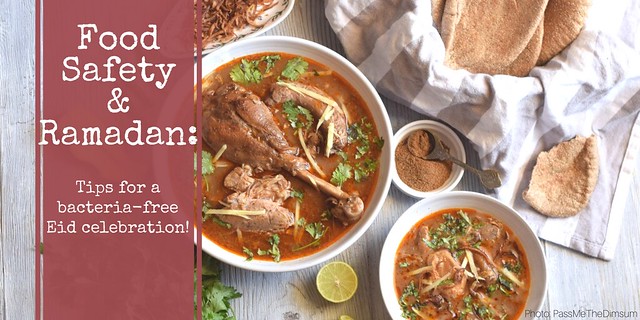
Ramadan is observed by more than 1 billion Muslims around the world. This holy month is a time of fasting and prayer for the followers of Islam, who abstain from food and drink each day from dawn until dusk. The end of Ramadan is marked with a celebration known as Eid al-Fitr, which stands for “breaking of the fast.” The celebration involves lavish dinners, which include delicacies and large dishes of lamb, chicken, omelets and salads.
During large celebrations, it’s important to ensure food safety measures are taken to avoid getting family and friends sick.
- Keep your hands clean at all times. Wash them thoroughly, for at least 20 seconds, with soap and warm water, especially before and after handling raw food. According to the Centers for Disease Control and Prevention, this is the simplest way to prevent most infections, including foodborne illness.
- Use separate cutting boards for fruits or produce for salads and raw lamb or chicken. This will help prevent cross contamination between ready-to-eat foods and raw meat or poultry. Also, USDA does not recommend washing any raw meat and poultry because it increases the risk of cross-contamination.
- The only way to make sure your meat and poultry is safe to eat is to cook it to a safe internal temperature as measured by a food thermometer. You can't see, smell or taste harmful bacteria that may cause illness. For that reason, USDA recommends the following minimum safe internal temperatures, as measured by a food thermometer:
- Beef, veal and Lamb - steaks, chops and roasts: 145°F and allow to rest for at least three minutes
- All poultry (breasts, whole bird and stuffing, legs, thighs, wings and ground poultry): 165°F
- Egg Dishes: 160°F
- Any leftover food should not be left out at room temperature for more than two hours. Instead, chill leftovers promptly. Bacteria grow and multiply rapidly at temperatures between 40-140°F.
Consumers with questions about food safety can call the USDA Meat and Poultry Hotline at 1-888-MPHotline (1-888-674-6854) or chat live with a food safety specialist in English or Spanish at AskKaren.gov, available from 10 a.m. to 6 p.m. ET, Monday through Friday.
